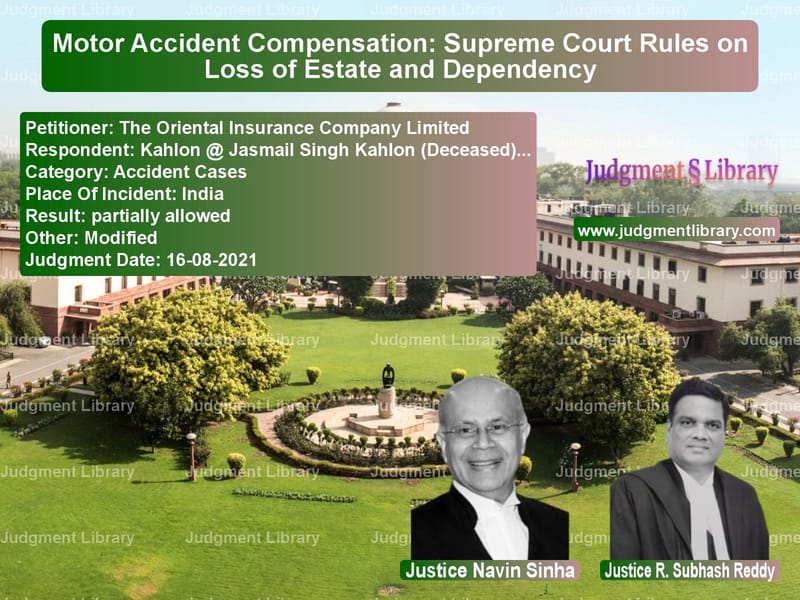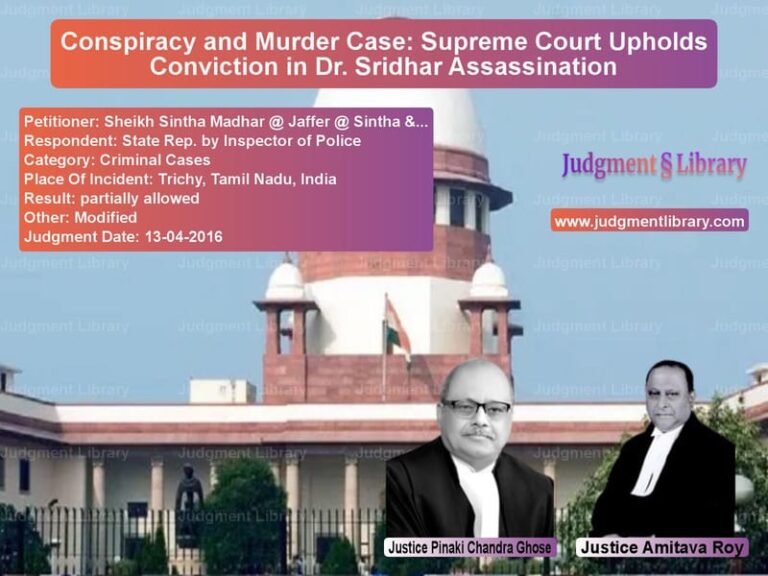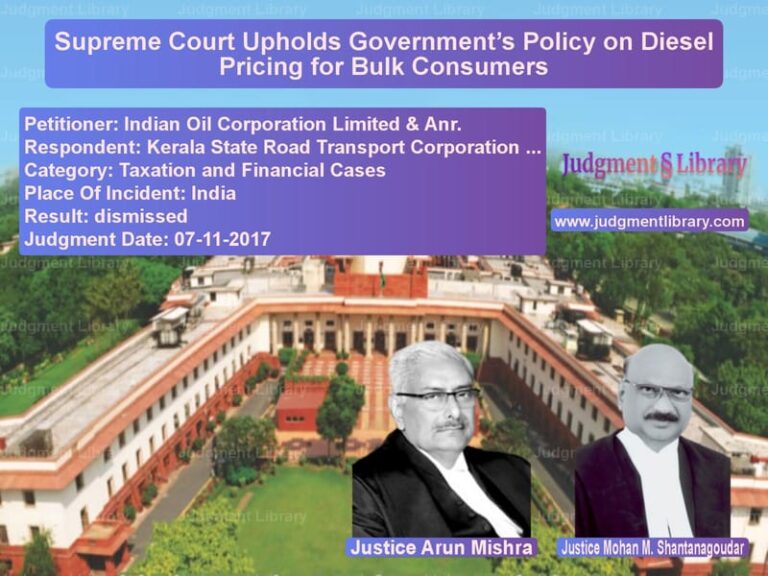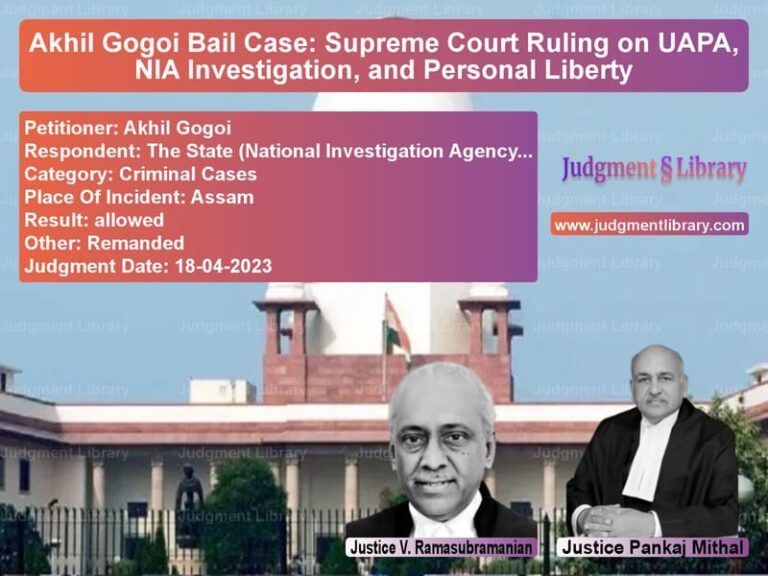Motor Accident Compensation: Supreme Court Rules on Loss of Estate and Dependency
The case of The Oriental Insurance Company Limited vs. Kahlon @ Jasmail Singh Kahlon (Deceased) Through Legal Representative Narinder Kahlon & Anr. is a landmark ruling in the domain of motor accident compensation. The Supreme Court examined whether compensation for personal injuries abates upon the death of the injured person due to reasons unrelated to the accident and how compensation for the loss of estate should be calculated.
The appeal arose from a compensation claim filed under Section 166(1)(a) of the Motor Vehicles Act, 1988. The original claimant, who suffered severe injuries in a motor accident in 1999, died during the pendency of his appeal, not due to accident-related causes. The High Court had substantially enhanced the compensation, prompting the insurer to appeal before the Supreme Court.
Background of the Case
The original claimant was severely injured in a motor accident on May 2, 1999. He suffered permanent disability and was unable to work. He initially filed a claim for compensation, but the legal battle prolonged for over two decades. Key events in the case include:
- The Motor Accidents Claims Tribunal (MACT) awarded the claimant Rs.1,00,000 with 9% interest on November 2, 2006.
- Dissatisfied with the compensation, the claimant appealed to the High Court, but he died on November 6, 2015, before the case was decided.
- The High Court, substituting his legal heir (his daughter), substantially enhanced the compensation.
- The insurance company challenged this decision in the Supreme Court, arguing that compensation for personal injuries does not survive beyond the claimant’s death when it is unrelated to the accident.
Petitioner’s Arguments
The insurer, The Oriental Insurance Company, contended that:
- The cause of action for personal injury abates upon the death of the claimant if the death was not caused by the accident.
- The legal heir could only claim compensation forming part of the estate of the deceased, not for pain, suffering, or future prospects.
- The High Court erred in awarding compensation using the multiplier method, which is applicable only in cases of death caused by an accident.
- The legal heir, being a married daughter, was not financially dependent on the deceased and therefore not entitled to compensation under loss of dependency.
Respondent’s Arguments
The legal heir of the deceased argued that:
- The loss of estate includes compensation for medical expenses, loss of income, and financial damage suffered due to injuries.
- Compensation should account for future earnings, since the deceased had lost his ability to work due to the accident.
- The High Court’s decision was justified in applying the multiplier method, as the injuries caused substantial financial losses to the estate.
- The deduction of one-third towards the deceased’s personal expenses was not applicable because he had already incurred expenses during his lifetime.
Key Legal Considerations
The Supreme Court examined the case based on:
1. Loss of Estate vs. Personal Injury Compensation
The Court clarified that while personal injury claims abate with the death of the claimant, claims related to loss of estate survive. This includes:
- Medical expenses incurred due to the accident.
- Loss of income and future earnings that would have accumulated in the estate.
- Expenses on attendants, diet, and hospital treatment.
2. Applicability of the Multiplier Method
The Court analyzed whether the multiplier method used for death claims should be applied to injury claims. It ruled that the multiplier method is valid if the injury permanently disabled the person and reduced their earning capacity.
3. Precedents on Loss of Estate
The Court referred to several cases, including:
- Surpal Singh vs. Raliyatbahen Mohanbhai Savlia (2009): Legal representatives can pursue loss of estate claims.
- Raj Kumar vs. Ajay Kumar (2011): Personal expenses deduction applies only in death cases, not in cases of disability.
- Kajal vs. Jagdish Chand (2020): Compensation must reflect the loss of livelihood due to disability.
Court’s Observations
The Supreme Court made several significant observations:
“If the legal heirs can pursue claims in case of death, there is no reason why they cannot pursue claims for loss of estate due to permanent disability.”
It further held:
“Loss of estate includes all financial losses suffered due to the accident, including income loss, medical expenses, and necessary expenditure on attendants and treatment.”
Final Verdict
The Supreme Court partially allowed the appeal and made the following rulings:
- The High Court’s application of the multiplier method was justified.
- Compensation under pain and suffering was disallowed as it was a personal claim that abated upon death.
- Medical expenses of Rs.1,00,000 were awarded.
- The final compensation amount was reassessed at Rs.28,42,175, to be paid within four weeks with 9% interest from the claim filing date.
The Court concluded:
“While claims for personal injuries do not survive after the claimant’s death, claims for loss of estate can be pursued by legal representatives.”
Implications of the Judgment
This ruling has significant implications for motor accident compensation:
- Clear Distinction Between Personal Injury and Loss of Estate: The judgment differentiates between compensation that abates upon death and compensation that survives.
- Legal Heirs Can Claim Financial Losses: This allows dependents to recover loss of income and estate caused by accident-induced disabilities.
- Medical Expenses Must Be Compensated: Even if the claimant dies, expenses incurred due to treatment remain valid compensation claims.
- Stronger Protection for Victims: The ruling ensures that even if a victim dies before the case is resolved, their heirs can claim rightful compensation for financial losses.
Overall, the judgment strengthens the principles of fair compensation in motor accident claims while clarifying the rights of legal heirs in pursuing loss of estate claims.
Petitioner Name: The Oriental Insurance Company Limited.Respondent Name: Kahlon @ Jasmail Singh Kahlon (Deceased) Through Legal Representative Narinder Kahlon & Anr..Judgment By: Justice Navin Sinha, Justice R. Subhash Reddy.Place Of Incident: India.Judgment Date: 16-08-2021.
Don’t miss out on the full details! Download the complete judgment in PDF format below and gain valuable insights instantly!
Download Judgment: the-oriental-insuran-vs-kahlon-@-jasmail-sin-supreme-court-of-india-judgment-dated-16-08-2021.pdf
Directly Download Judgment: Directly download this Judgment
See all petitions in Compensation Disputes
See all petitions in Motor Vehicle Act
See all petitions in Negligence Claims
See all petitions in Road Accident Cases
See all petitions in Damages and Compensation
See all petitions in Judgment by Navin Sinha
See all petitions in Judgment by R. Subhash Reddy
See all petitions in partially allowed
See all petitions in Modified
See all petitions in supreme court of India judgments August 2021
See all petitions in 2021 judgments
See all posts in Accident Cases Category
See all allowed petitions in Accident Cases Category
See all Dismissed petitions in Accident Cases Category
See all partially allowed petitions in Accident Cases Category







